
Weekly Body Cleanse and Its Benefits for a Healthy Mind and Body

Weekly Body Cleanse - Why and How to Restart Your Body
In today's world, where stress, information overload, sedentary lifestyles, and processed foods have become a regular part of daily routine, more and more people are turning to simple yet effective methods to support physical and mental balance. One natural solution is the weekly body cleanse, a short-term but intensive method to lighten the load on the body and give it space to regenerate.
What Does Body Cleansing Really Mean?
Unlike radical diets or quick detoxes that often promise miracles overnight, a weekly cleanse is based on principles of gradual alkalization, hydration, digestion support, and overall regeneration. It's not about starving, but about consciously limiting stress factors—such as sugars, alcohol, caffeine, processed foods, and stress—and replacing them with nutritious, light, and natural alternatives.
The aim of cleansing is not extreme weight loss but restoring balance. In other words, it's a kind of "restart" for the body, which can bring better sleep, more energy, improved digestion, and a more positive mood. And that's where its magic lies.
Why Give the Body Time to Lighten Up
Our bodies are, in many ways, a miraculous system with a natural ability to cleanse. Organs like the liver, kidneys, intestines, lungs, and skin work daily to remove toxins and metabolic waste. However, in today's environment—whether it's polluted air, pesticides in food, or chemicals in cosmetics—this burden is significantly higher than in the past.
This is precisely why more people are turning to regular cleansing. According to nutrition specialists from Harvard T.H. Chan School of Public Health, even a short-term change in diet and lifestyle can significantly improve the body's ability to regenerate, strengthen immunity, and reduce inflammation levels in the body. The effect often shows on the skin, which becomes clearer and healthier, or on the psyche—in the form of less fatigue or better concentration.
How a Weekly Body Cleanse Can Look in Practice
There is no single universal recipe that fits everyone. Each person has different needs, health status, and lifestyle. However, several basic principles prove effective during a cleanse.
1. Simplicity is Golden
The foundation is returning to natural foods. This means lots of vegetables, fruits, legumes, whole grains, herbs, and healthy fats, such as olive or flaxseed oil. It's also worth limiting animal products, especially red meat and dairy, which can be harder to digest.
2. Plenty of Fluids
During the cleanse, the body needs more water than usual. Ideal choices are pure water, herbal teas (e.g., nettle, dandelion, or milk thistle), or vegetable juices. Starting the day with lukewarm water with lemon is good, as it kick-starts digestion and encourages metabolism.
3. Movement and Rest
Even though the cleanse might be physically less demanding, movement remains important. Light walks, yoga, or breathing exercises help the body get rid of toxins through the lymphatic system. Equally important is quality sleep and rest—the body regenerates mainly at night.
4. Mental Hygiene
A weekly cleanse is not just about the physical body. Stress, negative emotions, and overstimulation can be as toxic as a poor diet. Therefore, it is recommended to limit digital devices at least for a few days, engage in mindful breathing, meditation, or simply spend time in nature. As psychologist Jana Kratochvílová says: "We cleanse the body, but let's not forget the mind."
What to Keep in Mind Before the Cleanse
Though a weekly cleanse might sound like a simple plan that anyone can handle, it is necessary to approach it with respect and caution. Switching to a lighter diet can initially be challenging for the body—some people experience fatigue, headaches, or irritability. These reactions usually soon subside and are a sign that the body is adapting.
It's also important not to immediately return to old habits after the week. A cleanse is most meaningful when viewed as a starting point for a longer-term change. This might involve establishing a regular drinking regime, reducing sugary drinks, increasing vegetables on the plate, or adopting a more mindful approach to eating in general.
A Real Example - Cleanse as the Start of a New Life Chapter
Lucie, a thirty-year-old graphic designer from Brno, went through her first weekly cleanse after several months of stressful work, irregular eating, and frequent exhaustion. "It wasn't about losing weight," she says, "but about not feeling good in my body anymore. The first two days were tough—I was hungry, and I had a headache. But then things improved—I had more energy, my skin cleared up, and mainly, I started taking better care of myself." Lucie now includes a cleanse every three months and claims it helps her maintain balance.
When a Cleanse is Suitable – and When to Be Cautious
A weekly body cleanse can be beneficial for almost any healthy adult, but there are situations where caution is needed. Pregnant and nursing women, people with chronic illnesses, eating disorders, or low blood pressure should consult a doctor or nutrition specialist before cleansing.
The ideal times for a cleanse are usually spring and autumn—transitional periods when the body naturally sheds excess. However, it's not wrong to embark on it after a challenging period, such as after holidays, a heavy diet, or a stressful time at work.
How to Make the Cleanse Easier and Actually Complete It
A big help is to prepare a menu and buy the necessary ingredients in advance, so one doesn't have to improvise and resort to something "quick" during the week. Supplements can also help, such as chlorella, spirulina, or psyllium fiber. Specialized stores, like Ferwer.cz, offer products suitable for the cleansing period—eco-friendly and gentle on the body and nature.
The menu doesn't have to be complicated. Simple meals can be prepared:
- Morning: oatmeal with fruit and seeds, or a smoothie with spinach and banana
- Lunch: vegetable soups, lentil curry, roasted vegetables with quinoa
- Dinner: salad with avocado and flaxseeds, or baked sweet potato with hummus
And let's not forget—it's not about perfection, but intention. Every step towards a healthier lifestyle counts.
A weekly body cleanse is not just a trendy fad, but a return to a life rhythm that honors naturalness, balance, and respect for one's body. In a fast-paced world, where pauses are often forgotten, it's an invitation to slow down, take a breath—and start anew.

